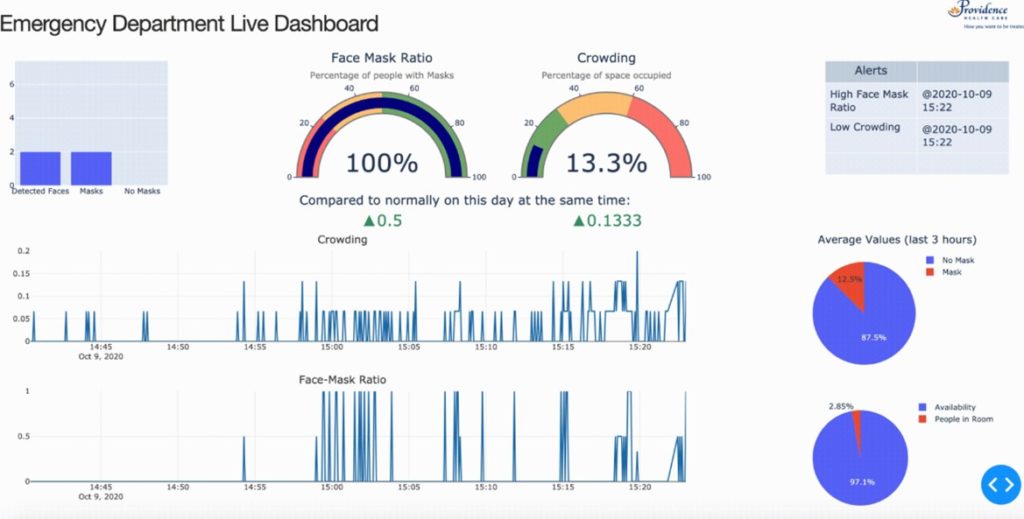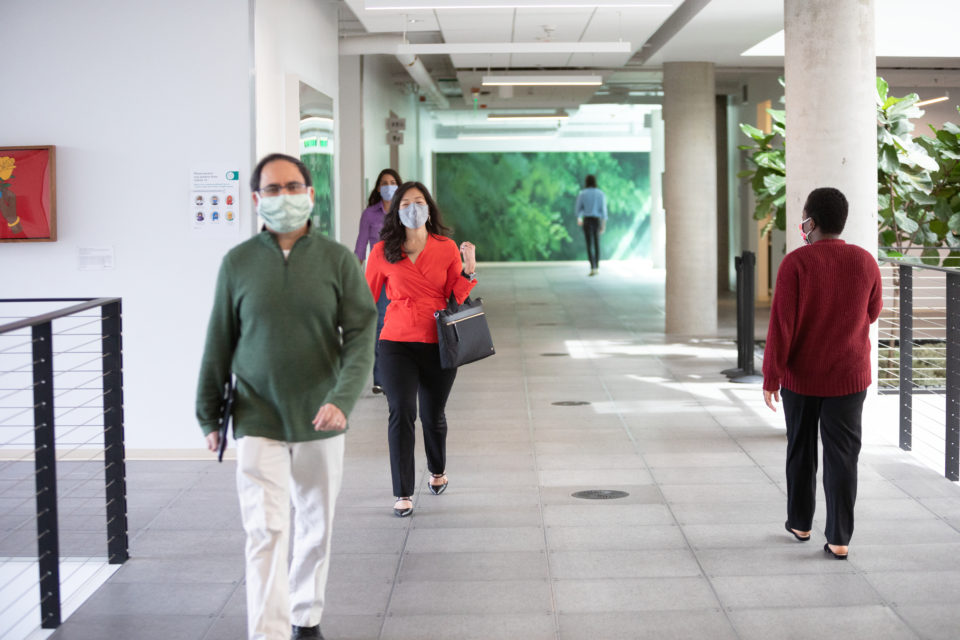As Canadian health officials continue to double down on mitigating the spread of COVID-19, a multidisciplinary collaboration has begun between Providence Health Care (PHC), Microsoft Canada and computer vision researchers at the University of British Columbia (UBC). Together, these organizations have developed an artificial intelligence (AI) powered solution to monitor the effectiveness of COVID-19 social distancing policies and guidelines at PHC’s St. Paul’s Hospital campus in Vancouver, B.C. This solution will help them plan for and maintain daily operations and routine procedures in the coming months.
Following the initial outbreak earlier this year, PHC began planning in expectation of a second wave of COVID-19 infection rates with a mission to improve patient outcomes, particularly among the most vulnerable in long-term care and acute care settings. By leveraging Microsoft’s expertise in the Internet of Things (IoT), edge computing and AI platforms in combination with UBC researchers’ capabilities in algorithm development, PHC has implemented – in pilot – deep learning AI tools to further prevent the spread of COVID-19.
These tools are designed to monitor personal protective equipment (PPE) use, social distancing and occupancy counting for the continued safety of patients, staff and visitors. First rolled out in the hospital’s emergency and radiology waiting rooms, and laboratory services, the project is facilitated using cameras that detect face mask usage and social distancing levels with a goal of eventually scaling to hundreds of cameras within high-traffic areas. Although they enable real-time compliance, the cameras do not collect personally identifiable information.
“Multidisciplinary collaborations with industry and academia expedited our development process, thereby directly assisting our efforts to plan for the urgent and ever evolving nature of the COVID-19 crisis. Our collaboration with Microsoft and UBC provided invaluable domain knowledge to help us move quickly, safely and effectively to help all stakeholders involved,” says Soyean Kim, Director of Digital Products at Providence Health Care. “The project could not have moved from inception to pilot at St. Paul’s Hospital so quickly without this spirit of collaboration for the common good.” without this spirit of collaboration for the common good.”
“The COVID-19 crisis has created new challenges and has placed unprecedented demands on Canada’s healthcare system. At Microsoft, we have been collaborating with our partners throughout the pandemic to solve big challenges by connecting data and systems in the cloud and putting safety measures and health guidelines in place for our healthcare organizations to better support patients and healthcare professionals,” says Dr. Helia Mohammadi, Chief Data Scientist and Healthcare Lead, Microsoft Canada. “Microsoft’s cloud and AI offerings, in particular solutions developed to address the COVID-19 pandemic, accelerate research findings and improve patient outcomes.”
As part of this project, PHC has implemented various Microsoft solutions including:
- Vision AI DevKit: Smart cameras for the Intelligent Edge enabling superior inferencing performance while ensuring privacy for hospital patients and staff
- Microsoft Power BI: Data visualization tools to ingest real time data from the cameras and quickly generate reports
- Azure IoT Edge: Connecting the cameras and the Azure cloud environment, all while running Azure machine learning modules to ensure personal identifiable information is not collected

“This initiative marks an exciting advancement for Providence Health Care in working to mitigate the spread of COVID-19 and improve patient outcomes for all, including the most vulnerable. It’s also an important milestone for Microsoft, providing major learnings for other healthcare environments regarding the deployment and adoption of AI and IoT technology in their operations,” says Moe Tanabian, Vice President and General Manager, Azure Edge Devices, Microsoft.
“AI-driven computer vision has come a long way, yet reaching the levels required for robust and widespread deployment in an ever-changing real world still holds many open challenges,” says Helge Rhodin, Assistant Professor, Department of Computer Science, UBC. “This joint project on handling the new normal yields a stimulating playground for algorithm development within a framework of privacy and ethical computing.”
“It has been exciting to work with a multidisciplinary team to see how we can best apply AI technology in hospital settings to reduce the chance of transmitting respiratory viruses in small spaces. The team has been responsive to iterative improvements with the goal of effectively monitoring adherence to measures we have in preventing the transmission of COVID-19 in some key areas at St. Paul’s Hospital,” says Dr. Victor Leung, Medical Director, Infection Prevention and Control, St. Paul’s Hospital.
In addition to adopting cutting-edge technology to mitigate the spread of COVID-19 among patients and visitors, PHC has recently been approved for and begun working with Microsoft Azure Edge Devices’ new IoT DevKit private preview program. With this technology, PHC plans to build and pilot new solutions for non-contact patient monitoring and monitoring of hand hygiene.
While the chapter is not yet closed on COVID-19, the lessons learned from PHC’s leadership implementing technology to control the spread of the virus and inform best practices across their organization’s operations will remain long after the pandemic has ended.






